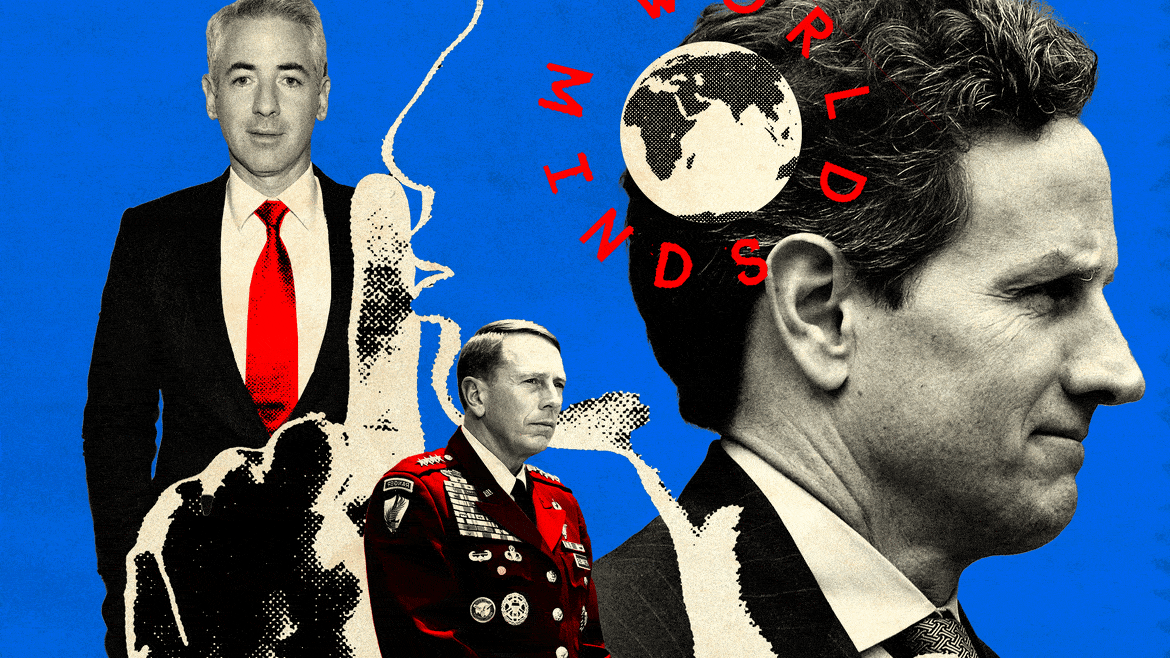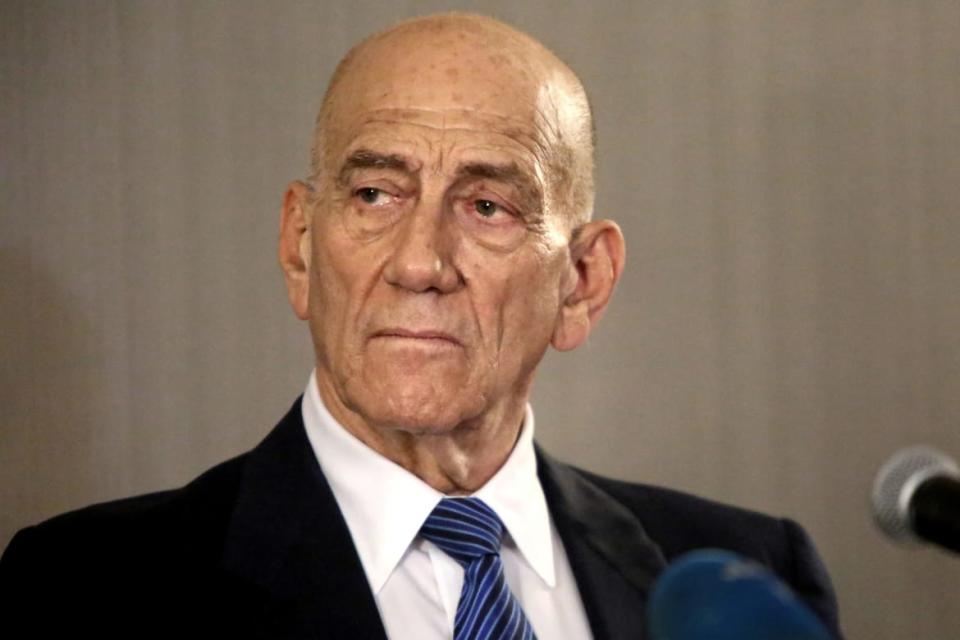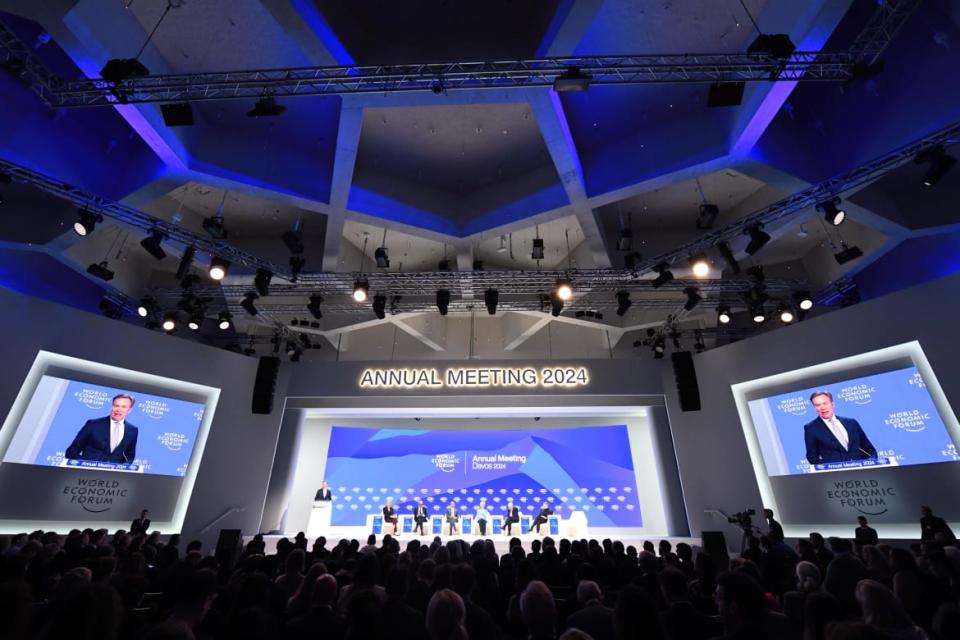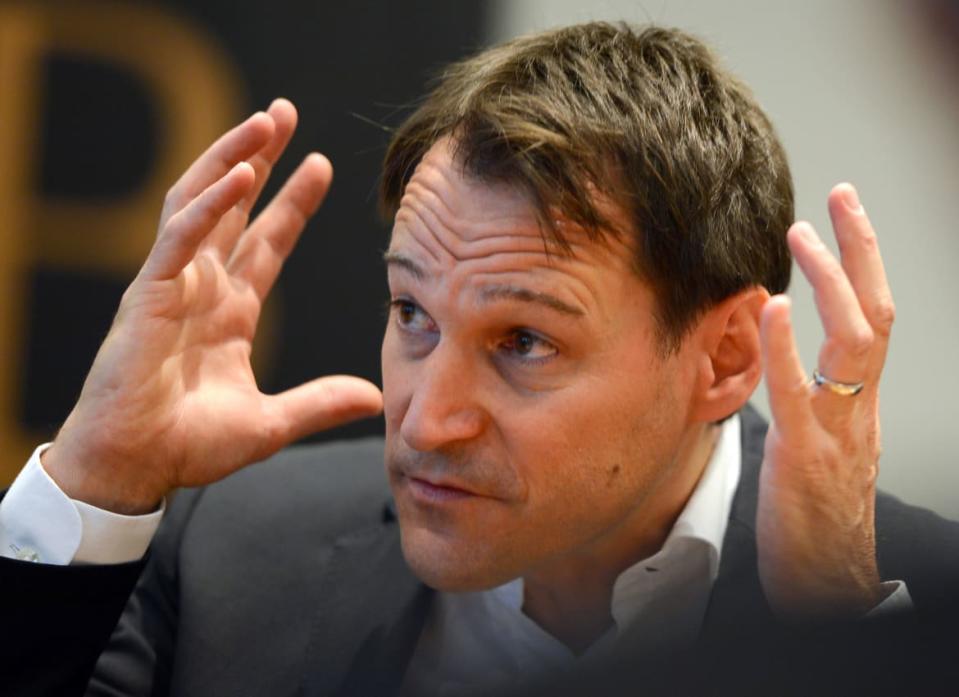The Global Elite Just Gathered at a Secretive Mini Davos

- Oops!Something went wrong.Please try again later.
- Oops!Something went wrong.Please try again later.
- Oops!Something went wrong.Please try again later.
- Oops!Something went wrong.Please try again later.
It was past midnight on Friday when the Swiss investor Guy Spier finally left the James Joyce pub in Zurich, after a night of carousing with luminaries of finance, government, and academia. The group had assembled for World.Minds—an under-the-radar fraternity for the global elite—which had just concluded its annual symposium.
The summit fashions itself as “the thinking man’s Davos,” one staff member told The Daily Beast. This year, scientists presented research on nuclear fusion and forensics, former Israeli prime minister Ehud Olmert detailed a peace plan for the Middle East, and members discussed the crisis in Ukraine.
“I have three friends that I made at World.Minds,” Spier said after a few glasses of wine. “Two are Fields Medalists.”
With just 1,500 members, World.Minds is a concentrated collective of wealth and power with a roster that includes former Treasury Secretary Timothy Geithner and retired Gen. David Petraeus, philosophers Peter Singer and Daniel Dennett, and billionaires Bill Ackman, Henry Kravis, and Alex Karp. Under its charter, at least 51 percent of the community must work in the sciences to ensure that it doesn’t “devolve into a business club.”
World.Minds does not accept membership applications, its website coldly states: “Unless you are an international scholar, do not contact us. We will contact you.” Never mind that there is no email address or phone number listed.
“We don’t make a big fuss,” founder Rolf Dobelli told The Daily Beast.

Former Israeli Prime Minister Ehud Olmert detailed a peace plan for the Middle East at the latest World.Minds symposium.
The discretion has fostered a comfortable space for power brokers to mingle without scrutiny or unwanted attention. “Nobody’s going to solicit you. You can talk normally as if you’re [with] your friends,” one participant said.
The group employs the so-called “Chatham House Rule,” meaning that members are permitted to recount internal discussions as long as they don’t disclose who said what.
Very rarely, however, details bleed out. As New York magazine reported in February, Ackman and his wife—embattled former professor Neri Oxman—recently held a World.Minds gathering at their home, at which Ackman pontificated on his war with Harvard’s then president, Claudine Gay. The billionaire had sent Gay a six-page letter railing against her leadership, and he wondered whether she would respond.
“I’m a theoretical physicist, so I get paid to make predictions,” Harvard professor Avi Loeb recalled of his response to Ackman; he speculated that Gay would not reply. (At another point that night, Loeb shared his “personal belief ” that “the Messiah will arrive, not necessarily from Brooklyn, as some Orthodox Jews believe, but rather from outer space.”)
The Davos summit, founded in 1971, remains the premier site for the global nobility to talk policy, though it has grown increasingly corporate and overcrowded. “It’s a warning for us to never go that way,” Dobelli said. World.Minds’ lofty mission—creating “a bridge between the science, business and cultural communities”—suggests that it is trying to recreate Davos’ early, more intimate days, if not supplant its larger rival entirely. But Dobelli insists he is simply trying to nurture intellectual curiosity.
“There’s a lot of companies [and] organizations that say, ‘We want to make the world a better place,’ like the World Economic Forum,” he said. “We are a little bit more humble. We first want to understand the world before we claim to improve it.”

World.Minds is far more low-key than the World Economic Forum meeting in Davos, shown here.
One scientist who has attended World.Minds events lauded that mission and described Dobelli as “very enthusiastic about knowledge.” But he said the group’s obsession with credentials can lead to a “circle jerk” atmosphere, and he found the scientific discussions frustratingly superficial.
He recalled listening to a prominent psychiatrist’s lecture on diagnoses. “Some of the questions were like, ‘Aren’t we all sort of crazy? Isn’t that what makes us special?’”
Dobelli said that World.Minds has almost “no rate of attrition,” and many members of the community, like Spier, are highly engaged.
“I ended up having coffee a couple of days ago with a professor of history,” Spier said. “Forgive me, it was orgasmic for me. It was just so wonderful.”
He had arranged the meet-up himself, but similar cross-pollination between industries happens at World.Minds “all the time,” he said. Spier argued that the summits are unpretentious, informative, and fun.
“I’m a guy who runs money. And I go to World.Minds and I have friends who are mathematicians or physicists,” he continued. “All you have to do is meet one or two or three people, and the world becomes different.”

“We don’t make a big fuss,” founder Rolf Dobelli says.
Now in his late fifties, Dobelli is handsome, with a strong jaw and gentle brown eyes. He is a polymath—a novelist and entrepreneur—and holds both an MBA and a PhD in philosophy. His 2011 nonfiction book, The Art of Thinking Clearly, was an international bestseller.
Sixteen years ago, Dobelli inadvertently formed the precursor to World.Minds when he decided to host an educational mixer in Zurich, having determined that “people in the business community don’t really know what’s going on with the latest scientific research.”
He assembled 20 top business people and 20 scientists, “from Nobel Prize winners to young stars,” at the Old Fashion Bar in Zurich. The scientists were given a simple mandate: “Tell us the coolest stuff you’re doing.”
Dobelli had planned the event as a one-off, but participants wanted to keep the conversations going. He founded Zurich.Minds, which grew into World.Minds, creating a formalized pipeline between academia and industry.
“There was this kind of joke [between members], that never since Einstein have so many intelligent minds gathered in one place in Switzerland,” one early attendee recalled.
Today, small groups of members meet roughly every week for candid Zoom calls with global leaders—perhaps a CEO, a top scientist, or a prime minister, a participant told The Daily Beast.
The group also meets in person for larger symposiums; this year, it will host summits in Serbia, Germany, and Switzerland. Past discussions have centered on microrobotics, dark matter, and the hunt for alien life.
“We never let the community know in advance what the program will be,” said chief operating officer Corinna Hoyer. That way, she explained, an attendee can’t say, “I’m not interested in those 15 minutes, so I’m going to take my board call.”
World.Minds operates both a nonprofit foundation and a separate, for-profit events arm. German media giant Axel Springer took a major stake in that business in 2022.
The group’s expenses are covered by its business members, Hoyer said, while academics and scientists don’t pay dues.
A researcher who has attended multiple World.Minds meet-ups told The Daily Beast that presenters are often far more candid than they would be in public. He recounted a speech from an executive at the European Space Agency who allegedly admitted that it was “not going to catch up” to Elon Musk and SpaceX. “You would not hear this stuff in other places,” the researcher said.
The downside of the summits, however, is that Dobelli curates his list of invitees based on his network, and people he finds fascinating, the person continued. As a result, the researcher felt that some academics were given platforms to share zany or unproven theories, even if “nobody agrees with them” in the scientific community. He singled out lectures on alien life in particular. (“It’s important to give [a] certain amount [of] room to controversial theories,” Dobelli retorted, noting that Einstein’s theory of relativity was initially controversial.)
Spier argued that World.Minds is just facilitating discourse. It’s “similar to TED, but with a kind of a Swiss finish,” he said.
Added one scientist: “It is a place where you might be waiting in line for champagne, and then you start talking with a professor who studies how peace breaks down in the world.”
Alexia Förster, who worked for World.Minds until 2020, said the group hosted speed networking sessions to help members make new contacts.
Asked about the group’s membership roster, Dobelli said he relishes bringing on former heads of state. “They’re actually more interesting to talk to” than their counterparts in office who can’t speak as openly, he said. To the contrary, CEOs who leave their jobs are typically given the boot.
“You know, we’ll have a heart to heart,” Dobelli said. “I mean, they’re grownups.”
One World.Minds member said the group has also disinvited participants seen as “too close to Russia,” or scientists whose arrogance rankled other attendees.
Dobelli, while insisting that he is not competing with Davos, said World.Minds participants revel in the intimate gatherings they used to find at the World Economic Forum.
“We have a lot of members in our community who [were] at Davos at the beginning. And they tell me, it was so beautiful,” he said. In those days, he elaborated, a CEO might sit at a table with former Palestinian leader Yasser Arafat and Israeli prime minister Shimon Peres and “kind of hash out stuff. And today, at Davos, this is not possible.”
If that sounds compelling, the challenge will be scoring an invite from Dobelli. “It’s not like, if you’re a great scientist, if you’re a billionaire, you get the right to come,” a World.Minds member said. For a change, the ultra-rich are confronted with an uncomfortable reality: “You can’t buy your way into it, and there’s not a ticket price.”
Get the Daily Beast's biggest scoops and scandals delivered right to your inbox. Sign up now.
Stay informed and gain unlimited access to the Daily Beast's unmatched reporting. Subscribe now.

